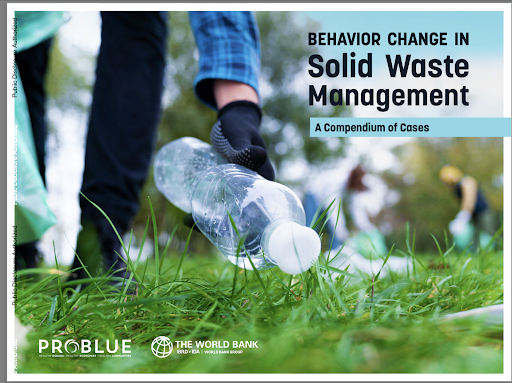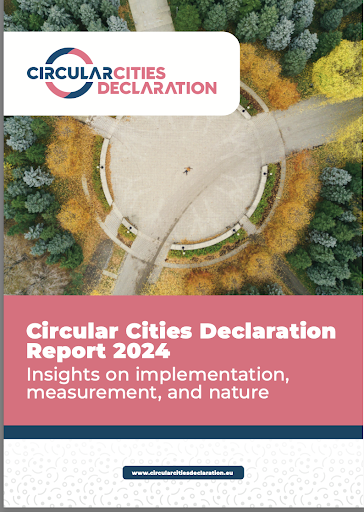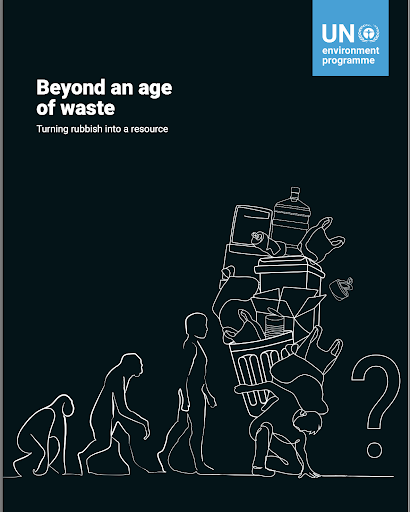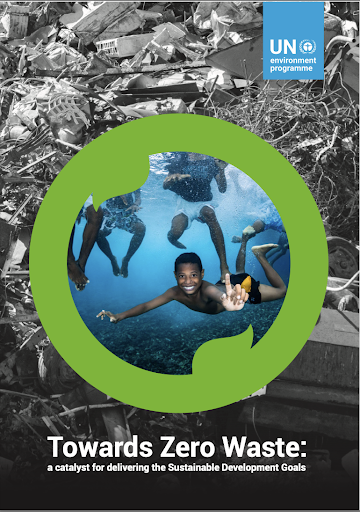
THEME OF THE FORTNIGHT
CIRCULAR ECONOMY AND WASTE MANAGEMENT
REPORTS
Behavior Change in Solid Waste Management

Author(s): The World Bank
Publication Details: The World Bank, 2024
The report delves into innovative approaches to address global waste management challenges through a behavioural science lens. Highlighting the alarming growth of municipal solid waste (MSW), especially in low- and middle-income countries, the report discusses the environmental and public health risks posed by poor waste practices, including marine litter and greenhouse gas emissions.
Through 30 global case studies, the report demonstrates how targeted interventions—like leveraging social norms, financial incentives, and system designs—can foster pro-environmental behaviour, improve recycling, and enhance service usage. A few case studies included in the report are integrating waste fees with utility bills in Tonga and community-driven recycling programs in Colombia. The compendium emphasises stakeholder collaboration, adequate financing, and policy integration as critical to developing sustainable, inclusive waste management systems. The report advocates for a transition to circular economy models and sustainable practices to mitigate environmental issues, enhance socio-economic outcomes, and ensure scalable waste management solutions globally.
Circular Cities Declaration Report 2024

Author(s): ICLEI, Ellen MacArthur Foundation, Circle Economy Foundation
Publication Details: ICLEI, 2024
The report provides an in-depth exploration of the progress made by European cities in transitioning to circular economies. Featuring contributions from 54 cities across 18 countries, the report highlights their efforts to address pressing challenges such as climate change, biodiversity loss, and economic resilience. It highlights a shift towards implementation, with 78 per cent of cities adopting circular strategies integrated into broader governance frameworks. Key areas of focus include food systems, bio-economy, and the built environment, with over 200 distinct actions identified. Challenges persist, particularly in funding, infrastructure, and policy alignment. The report also emphasises the growing importance of measurement, with cities adopting advanced indicators to track material flow, environmental impact, and behavioural shifts.
The insights demonstrate how the circular economy contributes to regenerating nature, with cities like Turku and Malmö setting ambitious targets on reuse and virgin material reduction. It stresses the need for cross-departmental collaboration and innovative systemic solutions to accelerate the transition. Finally, the report offers six priority actions to guide cities in embedding circularity into decision-making, from setting upstream consumption targets to advocating for supportive regulatory frameworks. This document serves as both a progress tracker and a roadmap, inspiring policymakers and stakeholders to strengthen commitments to circular development and sustainability.
Read More: https://circularcitiesdeclaration.eu/fileadmin/user_upload/Resources/CCD-Report-2024.pdf
Global Waste Management Outlook 2024: Beyond an Age of Waste – Turning Rubbish into a Resource.

Author(s): United Nations Environment Programme (UNEP) and the International Solid Waste Association (ISWA)
Publication Details: United Nations Environment Programme, 2024
The Outlook- the report is an authoritative analysis addressing the escalating global waste crisis. It highlights the production of more than two billion tonnes of municipal solid waste (MSW) annually, projected to increase by 56 per cent by 2050 without intervention. This waste management challenge significantly impacts climate change, biodiversity, and pollution—three interconnected planetary crises.
The report introduces three waste management scenarios: "Business as Usual," "Waste Under Control," and "Circular Economy." It advocates for a shift towards a circular economy that prioritises waste prevention, reuse, and recycling. Key findings emphasise the disparity in waste collection services, with high-income regions achieving near-universal coverage, while less than 40 per cent of waste is collected in low-income countries.
Critical issues include the lack of standardised data, inadequate recycling rates, and growing quantities of hazardous waste. The report stresses the role of innovative policies, extended producer responsibility (EPR), and behavioural science in fostering sustainable consumption and production.
UNEP provides a roadmap with actionable recommendations to improve waste governance, reduce resource use, and enhance environmental and social equity.
Read More: https://www.unep.org/resources/global-waste-management-outlook-2024
Towards Zero Waste: A Catalyst for Delivering the Sustainable Development Goals

Author(s): Zoë Lenkiewicz
Publication Details: United Nations Environment Programme, 2023
The report discusses the urgency of adopting zero-waste strategies to address the escalating global waste crisis, which threatens human health, ecosystems, and sustainable development. It links waste management directly to achieving the 2030 Sustainable Development Goals (SDGs) and highlights the need for a circular economy to mitigate the triple planetary crises of climate change, biodiversity loss, and pollution.
Key insights include the staggering rise in municipal waste, projected to reach 3.88 billion tonnes by 2050, and the unequal burden of mismanaged waste on vulnerable populations, particularly in the Global South. The report advocates for a three-pronged action framework: establishing waste control, implementing sound waste management, and transitioning towards circularity by viewing waste as a resource.
Recommendations include integrating waste management into national policies, fostering inclusive economic opportunities, and prioritising resource recovery. Case studies demonstrate innovative practices like upcycling, composting, and biogas production. The report also highlights the importance of gender equality, education, and community participation in creating sustainable waste solutions.
This comprehensive resource aims to mainstream waste management into sustainable development, offering actionable pathways for nations to mitigate waste-related challenges and achieve equitable and environmental progress.
Read More: https://wedocs.unep.org/bitstream/handle/20.500.11822/44102/towards_zero_waste.pdf
RESEARCH PAPERS
Innovations to Overcome the Current Waste Problem Caused by Single-Use Plastics in the Pursuit of a Circular Economy
Author(s): Luisa Marie Altenburger , StellaMaria Yerokhin, Leonard Mayer, Samanthi DijkstraSilva
Publication Details: Sustainability Nexus Forum, 2024
This paper examines the growing issue of plastic waste. With only 9 per cent of plastics being recycled, and its adverse impacts on ecosystems and natural habitats, this paper focuses on the food industry as a significant contributor to plastic waste. The study highlights the rising demand for bio- based plastics as environmentally sustainable alternatives within the framework of a circular economy.
The paper presents a systematic review that explores innovations in materials and additives for bio- based plastics, particularly in food packaging, arguing that many such materials originate from the food industry’s value chain. Additionally, the paper highlights the importance of developing biodegradable and recyclable plastics to reduce the environmental impact of plastic waste, especially in the context of single-use food packaging. The paper proposes a framework categorising materials based on biodegradability, origin (plant- or animal-based by-products and raw materials), and end-of-life scenarios. This research advances academic and practical understanding by critically evaluating materials labelled as environmentally sustainable, highlighting potential misconceptions, and offering insights into their broader implications.
Read More: https://link.springer.com/content/pdf/10.1007/s00550-024-00547-9.pdf
Characterization of Excavated Plastic Waste from an Indian Dumpsite: Investigating Extent of Degradation and Resource Recovery Potential
Author(s): Roshan Vilasrao Mankhair, Ayush Singh, and Munish K Chandel
Publication Details: Waste Management & Research, 2024
This study explores the emerging practice of landfill mining in India, focusing on the excavation and valorisation of plastic waste to support a circular economy. Excavated plastic waste offers potential as a resource for materials and energy, but its degradation and weathering in landfills pose challenges for effective utilisation.
The research investigates the physicochemical changes in aged plastic waste from an Indian dumpsite (Deonar, Mumbai) to identify feasible valorisation options. Material and energy flow analyses were conducted, specifically evaluating incineration as a treatment method. Findings reveal that plastic waste constitutes 3.6 to 21 per cent of the landfill content, with a significant increase in recent decades due to growing plastic consumption in India. High- and low-density polyethene (HDPE and LDPE) comprise approximately 66 per cent of the excavated waste, often contaminated with surface impurities. Mechanical pre-treatment, such as shredding, achieved impurity recovery rates of 50−70 per cent for polyethylene and 70−90 per cent for other plastics.
Scanning Electron Microscopy highlighted surface morphology changes with ageing, while Fourier Transform Infrared Spectroscopy (FTIR) confirmed low levels of degradation, corroborated by elevated oxygen content in the waste. Energy flow analysis estimated that incinerating one tonne of excavated plastic waste could generate approximately 1410 kWh of electricity, illustrating its potential as an energy source. This study underscores the importance of developing strategies for effectively managing aged plastic waste in landfills to enhance resource recovery and energy production.
Read More: https://journals.sagepub.com/doi/full/10.1177/0734242X231219654
Policy Pathways to Sustainable E-Waste Management: A Global Review
Author(s): Sai Preetham Grandhi, Pranav Prashant Dagwar, Deblina Dutta
Publication Details: Journal of Hazardous Materials Advances, 2024
This study explores the global challenge of electronic waste (E-waste), which amounted to approximately 57 million tonnes in 2021, with only 9 million tonnes properly being recycled. The mismanagement of E-waste, including illegal recycling, improper landfill disposal, and illicit exports, poses significant environmental and societal risks. The study examines innovative E-waste policies across various countries which include Extended Producer Responsibility (EPR), WEEE directives, regional laws, and State-level laws, highlighting successful strategies such as incentivised recycling programs and stricter regulations on hazardous materials. The paper emphasises the importance of sustained, well-structured efforts and effective policy interventions to mitigate E-waste impacts. These policies are crucial for minimising E-waste generation, ensuring proper disposal methods, raising public awareness, promoting device repair and refurbishment, and enhancing recycling rates. The study also highlights the role of E-waste management start-ups in monetising these efforts. It provides insights into the latest global E-waste trends and highlights the critical role of robust policies in managing this growing challenge.
Read More: https://www.sciencedirect.com/science/article/pii/S2772416624000743
The Crucial Role of Circular Waste Management Systems in Cutting Waste Leakage into Aquatic Environments
Author(s): Adriana Gómez-Sanabria, Florian Lindl
Publication Details: Nature Communications, 2024
The paper examines the critical role of circular waste management systems in mitigating waste leakage into aquatic ecosystems. Using spatial analysis and Shared Socioeconomic Pathways (SSPs), the study projects future waste leakage under current conditions and develops mitigation strategies up to 2040, focusing on municipal solid waste (MSW).
Current global waste mismanagement resulted in 64 per cent of MSW being improperly handled, with significant proportions ending up in open dumpsites, being burned, or scattered. By 2040, MSW generation is projected to increase by 20 to 68 per cent, depending on socioeconomic scenarios. The study identified hotspots for waste leakage, with 70 per cent of global leakage originating in regions like China, South Asia, Africa, and India. This study exacerbates risks of waste entering rivers, lakes, and coastal areas, threatening ecosystems and human health. While food and plastic waste constitute major fractions, plastic accounts for a significant portion of waste leakage into aquatic environments, especially rivers.
Scenarios demonstrate that regions with weak infrastructure face higher leakage risks, underscoring the need for tailored strategies. Even in optimal conditions, leakage cannot be eliminated by 2030, failing to meet the Sustainable Development Goals. The paper advocates for integrated strategies targeting waste collection, recycling, and management alongside the implementation of behavioural measures to reduce waste generation. The study calls for globally standardised reporting frameworks to monitor waste flows and enhance policy effectiveness.
Read More: https://www.nature.com/articles/s41467-024-49555-9




